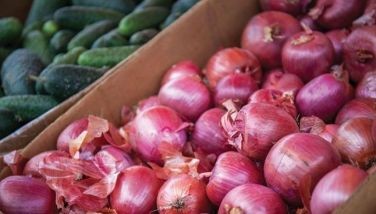Quedancor, RBAP to launch P500-M loan facility for farmers
March 31, 2005 | 12:00am
The Quedan Rural Credit and Guarantee Corp. (Quedancor) and Rural Bankers Association of the Philippines (RBAP) will be launching a P500-million Multi-Investment Program for Small Farmers and Fisherfolks. Nelson Buenaflor, president and chief executive officer of Quedancor, said the program will enable his agency to increase its loan releases this year which is projected at P5.1 billion.
Under the program, RBAP members, numbering 725, will purchase promissory notes (PNs) issued by Quedancor to organized small farmers and fisherfolk organizations.
"The PNs cover mostly production and livelihood projects of Quedancor. Through this program, we will be able to expand our loan releases. At the same time, the scheme reduces the delivery cost of banks since it will be our agency that will be retailing the loans," said Buenaflor.
He said the PNs sold by Quedancor to RBAP will be covered by a sovereign guarantee. This should make it attractive for banks to participate in the program since it is risk-free.
"It also marks the first time that rural banks will be buying PNs from participating sectors in Quedancor programs," said Buenaflor, adding that the rates will be pegged to Treasury bill rates plus four percent.
Buenaflor said the program also enables banks to comply with the Agri-Agra Law which requires financial institutions to set aside at least 25 percent of their total loanable funds to the agriculture and agrarian reform sectors.
Bangko Sentral ng Pilipinas data show that rural rural banks exceeded the 25-percent agri-agra credit requirement with a compliance rate of 46.6 percent during the first half of 2004.
However, the overall compliance rate by the entire banking system for agri-agra credit was only 26.5 percent, because the commercial banks and thrift banks recorded a compliance rate of only 18.8 percent and 22.7 percent, respectively.
Bigger banks have also taken advantage of a loophole in the law that allows them to invest in government securities as compliance with the law. As a result, access to credit especially in the countryside, has been very limited, with banks preferring to lend to big agro-based industries rather than to small farmers and fisherfolks because of the risky nature of agriculture.
"Admittedly rural banks’ reach is limited, but through Quedancor, they will be able to increase their customer base because we will be tapping our regional and district offices to retail these loans," said Buenaflor.
Quedancor has 63 district offices and 18 extension offices nationwide. Quedancor, the credit arm of the Department of Agriculture is mandated to speed up the flow of investments and credit resources into countryside enterprises that would spur economic growth and employment.
To do this, Quedancor taps banks for a direct credit facility with rediscounting and sale of PNs wherein a bank will turn over PNs of qualified borrowers under identified Quedancor programs.
Under the guarantee facility, Quedancor guarantees up to 85 percent of the unsecured loan portfolio in the lending entitities’ portfolio.
On the other hand, under the joint-venture scheme, Quedancor enters contractual arrangements with farmers‚ cooperatives and commercial firms wherein parties provide each other with production area, inputs, labor, technology, infrastructure, machinery and equipment, management, financing assured market and/or supply of farm produce that enhances backward and forward integration.
Under the program, RBAP members, numbering 725, will purchase promissory notes (PNs) issued by Quedancor to organized small farmers and fisherfolk organizations.
"The PNs cover mostly production and livelihood projects of Quedancor. Through this program, we will be able to expand our loan releases. At the same time, the scheme reduces the delivery cost of banks since it will be our agency that will be retailing the loans," said Buenaflor.
He said the PNs sold by Quedancor to RBAP will be covered by a sovereign guarantee. This should make it attractive for banks to participate in the program since it is risk-free.
"It also marks the first time that rural banks will be buying PNs from participating sectors in Quedancor programs," said Buenaflor, adding that the rates will be pegged to Treasury bill rates plus four percent.
Buenaflor said the program also enables banks to comply with the Agri-Agra Law which requires financial institutions to set aside at least 25 percent of their total loanable funds to the agriculture and agrarian reform sectors.
Bangko Sentral ng Pilipinas data show that rural rural banks exceeded the 25-percent agri-agra credit requirement with a compliance rate of 46.6 percent during the first half of 2004.
However, the overall compliance rate by the entire banking system for agri-agra credit was only 26.5 percent, because the commercial banks and thrift banks recorded a compliance rate of only 18.8 percent and 22.7 percent, respectively.
Bigger banks have also taken advantage of a loophole in the law that allows them to invest in government securities as compliance with the law. As a result, access to credit especially in the countryside, has been very limited, with banks preferring to lend to big agro-based industries rather than to small farmers and fisherfolks because of the risky nature of agriculture.
"Admittedly rural banks’ reach is limited, but through Quedancor, they will be able to increase their customer base because we will be tapping our regional and district offices to retail these loans," said Buenaflor.
Quedancor has 63 district offices and 18 extension offices nationwide. Quedancor, the credit arm of the Department of Agriculture is mandated to speed up the flow of investments and credit resources into countryside enterprises that would spur economic growth and employment.
To do this, Quedancor taps banks for a direct credit facility with rediscounting and sale of PNs wherein a bank will turn over PNs of qualified borrowers under identified Quedancor programs.
Under the guarantee facility, Quedancor guarantees up to 85 percent of the unsecured loan portfolio in the lending entitities’ portfolio.
On the other hand, under the joint-venture scheme, Quedancor enters contractual arrangements with farmers‚ cooperatives and commercial firms wherein parties provide each other with production area, inputs, labor, technology, infrastructure, machinery and equipment, management, financing assured market and/or supply of farm produce that enhances backward and forward integration.
BrandSpace Articles
<
>
- Latest
- Trending
Trending
Latest
Trending
Latest
Recommended



























